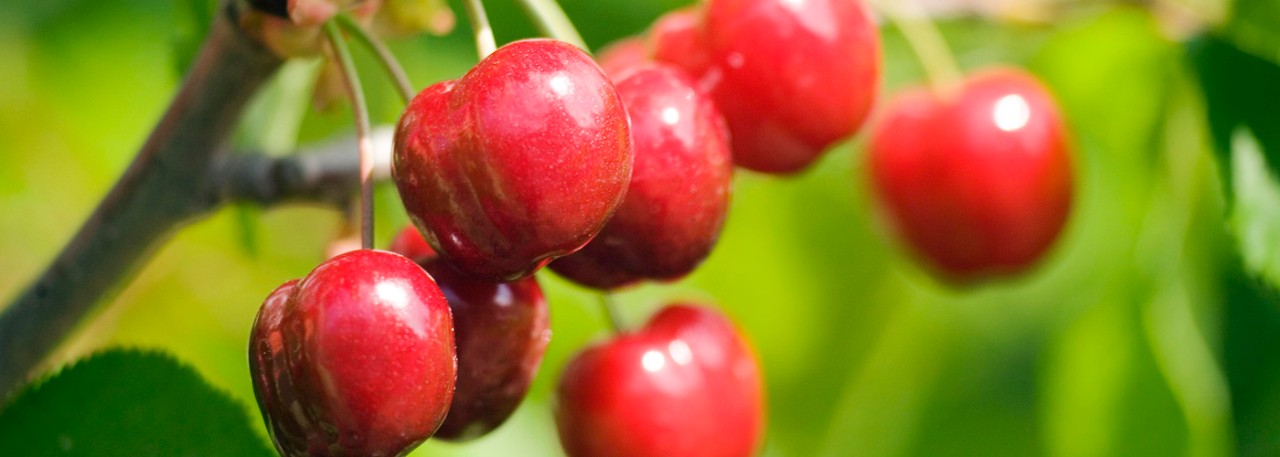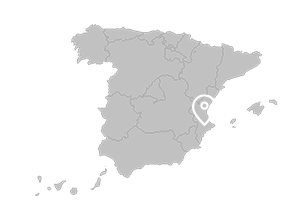.png.transform/rendition-xs/image_image%20(1).png)
Cerezas de la Montaña de Alicante PGI
Fruit of the Buriat, Tilagua, Pianera, Picota, Starking, Corazón de Pichón and Ambrunesa varieties, from the Prunus avium L or Prunus cerasum L families (or their hybrids), designated for fresh human consumption.
Tasting notes
Sweet flavor with soft flesh.
Other notes
Carmine to vivid red in color, ball-shaped and usually with a slightly pointed base. The fruit is presented with the stalk intact.
Cherries protected under this PGI will only be those from the Extra and First categories, the determination of which will be based on the varieties in question.
Buriat, Starking, Corazón de Pichón and Picota varieties
- Extra Normal equal to or greater than 26 mm (0.83 in)
- Extra Valls equal to or greater than 24 mm (0.83 in)
- First equal to or greater than 22 mm (0.83 in)
Tilagua, Planera and Ambrunesa varieties
- Extra Normal equal to or greater than 25 mm (0.83 in)
- Extra Valls equal to or greater than 23 mm (0.83 in)
- First equal to or greater than 21 mm (0.83 in)
Production / Processing method
Seeds are sown in patterns which are best suited to the soil conditions. The planting framework is from 6 x 6m to 6 x 7m (19.68 x 19.68 ft or 19.68 x 22.96 ft) for goblet formations, and 4 x 5m to 4 x 6m (13.12 x 16.40 or 13.12 x 19.68 ft) for the palmette formation.
Three or four excavations are normally carried out, with the first and deepest taking place at the end of October. Subsequently, three or four runs of a rotavator (agricultural machinery) are carried out in the vegetation area. The plants are trained in either goblet or palmette formation, and only light pruning is carried out on the production trees, limited to thinning and budding. Young trees tend to be shaped through the suppression of branches and budding, forcing them to produce branches.
The cherry harvest consists of picking the fruit directly from the tree, and should be carried out with great care only when the fruit has suitably matured.
In the industrial premises, the following treatment and packaging processes are carried out:
-Arrival in the factory and pre-storage. The fruit may be stored in a covered, well-aerated area for the amount of time required to ensure perfect coloring.
-Any blemished, damaged, burst or low-color fruit is removed.
-The cherries are classified according to their color and size, thus ensuring uniform pieces.
-The product is placed in its packaging. The contents of each package will be uniform, and will only contain fruit of the same origin, variety, quality and caliber, all perfectly uniform. The visible part of the package’s contents will be representative of the contents as a whole.
- The cherries must be treated in such a way as to ensure suitable protection of the product. Materials used in the interior of the packaging, especially papers, must be new, clean and of such a nature as to cause no alteration to the fruit.
Geography / Relief and climate
The production area is one of the most mountainous landscapes in the Valencian Community, belonging to the foothills of the Prebetic sub-unit, with a typically structural appearance, alternating between anticlinal and synclinal structures.
Of particular note are the cretaceous limestone in the mountains and the shale in the valleys.
The soils of this region are characterized by high calcium carbonate content, as well as a lack of organic materials. It is also important to point out the presence of soils with clay skins, in some cases exhibiting very high levels.
The climate is warm and Mediterranean, with colder temperatures and higher rainfall than in the rest of the province. Average annual temperatures fluctuate between 13 ºC and 15 ºC (55.4 and 57.2 ºF), with average annual rainfall of 350-650 mm (13.77 – 25.99 in).
The main rivers that cross the region are the River Serpis (or River Alcoy) and the River Girona. The former rises from the meeting point of various sources from the Mariola and Carrascal mountain ranges, and has as its tributaries the Rivers Gorga and Penáguila to the right, and the Agres to the left. The latter rises in the Llombay range, crosses the Alcalá, Ebo and Laguart valleys, and flows into the Mediterranean.
Regulatory Council
Consejo Regulador de la IGP Cerezas de la Montaña de Alicante
Ctra. Albaida-Denia, s/n.
03788 Alpatró (Alicante)
Tel: (+34) 966 406 640
Fax: (+34) 966 406 640
info@cerezas.org
www.cerezas.org/
Sources:
The fruit is presented with the stalk intact.


- /content/dam/en/icex-foodswines/images/products/fruits---vegetables/cerezas-de-la-montaña-de-alicante-pgi/Cerezas%20de%20la%20Montaña%20de%20Alicante%20PGI%20carr1.jpg
- /content/dam/en/icex-foodswines/images/products/fruits---vegetables/cerezas-de-la-montaña-de-alicante-pgi/Cerezas%20de%20la%20Montaña%20de%20Alicante%20PGI%20carr2.jpg

Alpatró (Valencian Community)
